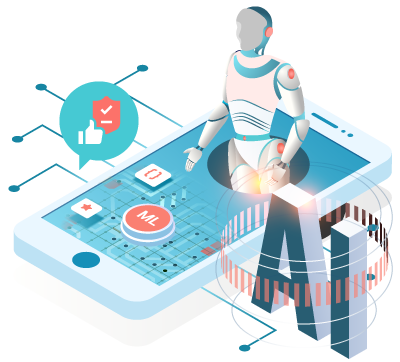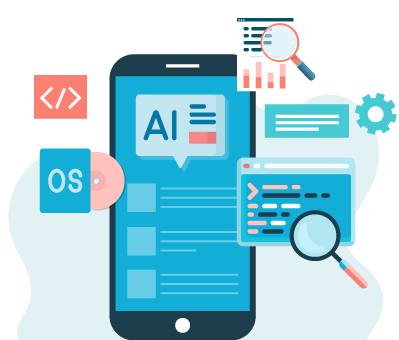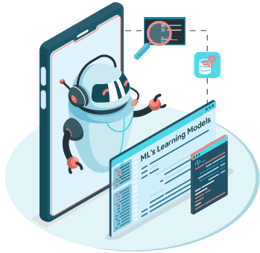
In today's rapidly evolving mobile app development sphere, achieving perfection is increasingly complex. Developers must navigate a growing diversity of devices, operating systems, and rising user expectations. Thus, the transformative power of Artificial Intelligence(AI) and Machine Learning(ML) has emerged as a game-changer. For QASource, our leading QA service organization specializing in AI mobile app testing, integrating AI and ML is not just a technological advancement but a strategic necessity.
This blog post will delve into how AI and ML are revolutionizing mobile app testing, significantly altering the quality assurance domain for the better.
The Traditional Testing Dilemma
Before we unravel the transformative aspects of AI and machine learning to test mobile apps, it's crucial to understand the challenges inherent in traditional testing methods. These include:

-
Device Diversity: The vast array of devices with varying screen sizes and specifications poses a significant challenge to ensuring uniform app performance.
-
Operating System Variations: Multiple operating systems and their different versions add another layer of complexity to the testing process.
-
Manual Test Case Creation: Creating test cases is time-consuming and prone to human error, impacting overall efficiency.
-
Execution of Test Scripts: Manually executing test scripts is a slow process, hindering the ability to quickly bring products to market, a crucial factor in the competitive app development landscape.
These challenges underscore the need for more advanced AI and machine learning to test mobile apps.
The Rise of AI in Mobile App Testing
With AI in mobile app testing, traditional testing paradigms are transformed into a more efficient and accurate process than ever before.
Automated Test Case Generation
AI is revolutionizing how test cases are generated. By leveraging machine learning algorithms, QA teams can analyze vast datasets, user behaviors, and application workflows to generate test cases intelligently. It expedites the testing process and ensures comprehensive coverage of various usage scenarios. At QASource, we've witnessed firsthand how AI-driven automated test case generation has become a cornerstone of our testing strategies.
Predictive Analysis for Defect Prevention
Machine Learning models have a unique capability: predictive analysis. By analyzing historical testing data, these models can predict potential defects and areas of vulnerability. This proactive approach allows QA teams to address issues before they impact users, enhancing the overall reliability of the mobile app.
Enhanced Test Automation
Traditional test automation often struggles to keep pace with the dynamic nature of mobile app development. AI-driven test automation tools are changing that. These tools can adapt to changes in the application's UI or functionality, ensuring that test scripts remain relevant even as the app evolves. This adaptability is crucial in today's agile development environments, where frequent updates are the norm.
Performance Testing Optimization
Performance testing has gained a new dimension with AI. Machine Learning algorithms can simulate real-world user interactions, helping QA teams conduct more realistic and efficient performance testing. It ensures that mobile apps can handle the demands of users across diverse network conditions and device specifications. At QASource, we've embraced this optimization to deliver performance testing beyond traditional metrics.
Intelligent Bug Detection and Analysis
AI-powered tools can swiftly detect and analyze bugs. These tools identify the existence of a bug and provide insights into its root causes. It accelerates debugging, reducing the time between identifying and resolving a defect. Intelligent bug detection is critical to delivering high-quality mobile app testing services.

ML's Continuous Learning Models
The dynamic nature of ML's continuous learning models marks a significant evolution in testing methodologies. Beyond mere predictive analytics, these models adapt and refine their understanding based on testing outcomes, progressively enhancing the precision and efficacy of our testing strategies. This iterative approach is perfectly attuned to the ever-evolving landscape of mobile app development, representing a leap forward in addressing quality assurance challenges.
QASource's Approach to ML and AI in Mobile App Testing
At QASource, integrating ML and AI in mobile app testing is not just a trend; it's a commitment to excellence. Our approach reflects our dedication to staying at the forefront of technological advancements. Here's how we leverage AI and ML to deliver unparalleled mobile app testing services:
-
Customized AI-Driven Test Suites
We believe in crafting tailored test suites using AI algorithms that align with the specific requirements of each mobile app. It ensures that our testing efforts are focused on critical areas, optimizing resource utilization. It's a customized approach that reflects our commitment to delivering value to our clients.
-
Seamless Integration with DevOps
In the world of DevOps, where speed and quality are inseparable, we integrate AI-powered testing seamlessly into the DevOps pipeline. It ensures that testing is not a bottleneck but a catalyst for the software delivery process. At QASource, we understand that agility and quality can coexist harmoniously.
-
Real-time Reporting and Insights
Our testing solutions provide real-time reporting and actionable insights. It empowers development teams to make informed decisions promptly. It's not just about finding bugs; it's about providing our clients with the information they need to drive continuous improvement.
Embracing the Future
Integrating AI mobile app testing is not just a trend but a commitment to excellence. At QASource, we're at the forefront of this evolution, redefining testing with more reliable and efficient solutions. The synergy between AI, ML, and mobile app testing represents a significant shift, setting new benchmarks in quality assurance.
However, the future of mobile app testing is undoubtedly linked with the advancements in AI and ML. Key developments to look forward to include:
- Self-healing Apps: AI-powered algorithms will be capable of autonomously monitoring their performance and rectifying minor issues in real-time. It will provide a more seamless user experience, minimizing disruptions.
- Predictive Testing: AI's ability to foresee potential issues will enable developers to tackle problems preemptively. This approach aims to eliminate bugs before they impact the user, significantly enhancing app reliability.
- Hyper-Personalized Testing: The future of testing is set to become increasingly individualized. AI will enable testing protocols specifically tailored to meet the unique needs of individual users, leading to highly personalized app experiences.
Conclusion
The emergence of AI in mobile app testing represents far more than a mere technological shift; it marks a revolutionary transition. At QASource, we are dedicated to leading this change, consistently focusing on the latest technological advancements to stay at the forefront of the industry. Our approach positions mobile app testing as a strategic asset for delivering superior user experiences. Our commitment is unwavering–to forge a future where each mobile application not only fulfills but surpasses the most stringent quality and performance benchmarks.
Have Suggestions?
We would love to hear your feedback, questions, comments and suggestions. This will help us to make us better and more useful next time.
Share your thoughts and ideas at knowledgecenter@qasource.com
